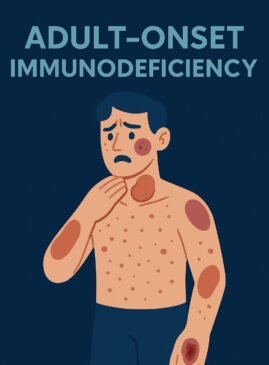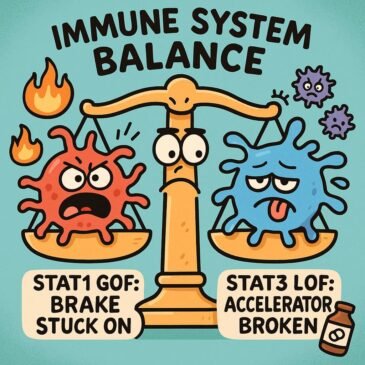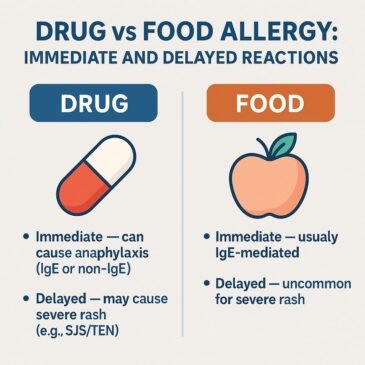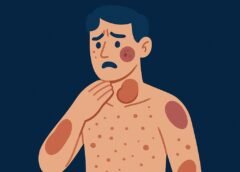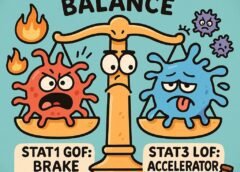Unsure about managing drug allergies? Learn effective strategies for communication, avoidance, and specialist care.
Read MoreNew Sequential Patch Testing for Fixed Drug Eruption (FDE) Diagnosis
Background Fixed drug eruption (FDE) is a cutaneous adverse drug reaction characterized by erythematous plaques or blisters that recur at the same site upon re-exposure to the causative drug. It can leave residual pigmentation and, in severe cases, may present as generalized bullous fixed drug reaction (GBFDE). Objective The study aimed to evaluate the sensitivity of a standardized allergy workup for diagnosing the cause of FDE, with an emphasis on in situ repeated open application tests (ROATs). Methods A retrospective multicenter study analyzed the allergy workup practices for FDE diagnosis…
Read MorePenicillin Allergy: Friend or Foe? New Tools Help Doctors Decide
Penicillin is a powerful and commonly used antibiotic, but many people mistakenly believe they are allergic. Up to 90% of people who think they have a penicillin allergy might not be truly allergic! [1] This can be a problem because penicillin is often the most effective and affordable treatment for many infections. New Tools for Identifying True Penicillin Allergies Two new scoring systems are helping doctors differentiate true allergies from misunderstandings: PEN-FAST and PEN-FAST +. PEN-FAST: A Quick and Easy Risk Assessment Pen-Fast [penicillin allergy, within last five years, anaphylaxis/angioedema,…
Read MoreThe Hidden Connection: Chronic Urticaria, Autoimmune Disorders & Hormonal Imbalance
Introduction to Chronic Urticaria Chronic urticaria, often referred to as hives, is a condition marked by the recurrent appearance of itchy welts on the skin. These welts, or hives, can vary in size and may appear anywhere on the body. The condition becomes chronic when these symptoms persist for six weeks or longer, distinguishing it from acute urticaria, which typically resolves within a shorter period. While the exact cause of chronic urticaria remains elusive in many cases, it is generally understood to be a complex interplay of factors. Symptoms of…
Read MoreUnderstanding the Evolving Landscape: New Nomenclature for Allergic Diseases and Hypersensitivity Reactions
Recent advances in immunology have deepened our understanding of allergic diseases and hypersensitivity reactions. Traditionally classified using the Gell-Coombs system (Types I-IV), the increasing complexity of these conditions has led to a proposed new nomenclature, especially for Type IV hypersensitivity. This blog provides an overview of the new classification and its clinical implications. Overview of Traditional Hypersensitivity Classification The Gell-Coombs classification includes: Here are the novel classifications of hypersensitivity reactions according to the new European Academy of Allergy and Clinical Immunology Position Paper published in Allergy. 2023 Nov;78(11):2851-2874. and…
Read MoreDrug Allergy Testing: A Comprehensive Guide
Available Drug Allergy Skin Tests Drug allergy skin tests play a crucial role in diagnosing potential allergic reactions to medications. Among the most common tests are the prick test, intradermal test, and patch test. Each of these tests has specific methodologies, applications, and diagnostic capabilities. The prick test, also known as a scratch test, is frequently used to identify immediate allergic reactions. During this test, a small amount of the suspected allergen is placed on the skin, usually on the forearm or back, and the skin is lightly pricked with…
Read MoreDistinguishing Drug Reactions from Viral Infections: A Case Study and the Role of Advanced Diagnostics
Acalculous cholecystitis with pericholecystic fluid collection as demonstrated by abdominal computed tomography scans. G, gallbladder
Read MoreAI Detectives: How Machine Learning Could Revolutionize Drug Allergy Diagnosis
Introduction Drug allergies can have severe consequences, necessitating accurate diagnosis and management. A research group focused on drug allergies has made significant progress in this area. They developed and evaluated two drug allergy prediction models, publishing the data in the Journal of Allergy and Clinical Immunology. The Models The study utilized a machine learning approach, specifically a random forest (RF) model and a logistic regression (LR) model, to identify culprit drugs based on drug-specific IFN-γ-releasing cells and clinical parameters in non-immediate drug hypersensitivity. The RF model achieved an average AUROC…
Read More

